Georgian Municipalities on a Journey to Become More Open
Municipios de Georgia en camino a ser más abiertos
Having served as a national researcher for Georgia from 2013 to 2019 for OGP’s Independent Reporting Mechanism, I have developed a particular interest in implementing the values of openness and accountability in local governments. From 2014-2015, Georgia implemented a series of local government reforms that allowed municipalities to directly elect the mayors along with the local council (sakrebulo) members and implement new mechanisms of citizen participation. This provided momentum to materialize my interest in open government. As the primary and regular point of contact for citizens with the state, local governments are directly responsible for addressing the day-to-day needs of their communities and have more opportunities to implement a variety of participatory mechanisms. I was able to operationalize this insight while leading the Local Government Program at the National Democratic Institute (NDI). Through this program I got to know the mayors, sakrebulo chairs, civil society representatives, and community leaders of different municipalities that all proved their uniqueness and value and inspired me to write a book. By that time I had already collected seven years of intensive practical experience of working with key local actors. I took a snapshot of this unique experience and underpinned it with relevant theoretical concepts to create Peculiarities of Open Governance Practices at the Local Level in Georgia.
The book shows that the Georgian municipalities are heavily influenced by the central government and lack powers of their own. This lack of decentralization hinders the full implementation of the open governance model within the municipalities. Local communities are demotivated to engage in policy-making as solving numerous problems they face is not within the powers and resources of their elected representatives. Low levels of economic development, poverty, unemployment and poor infrastructure are homogenous across the municipalities.
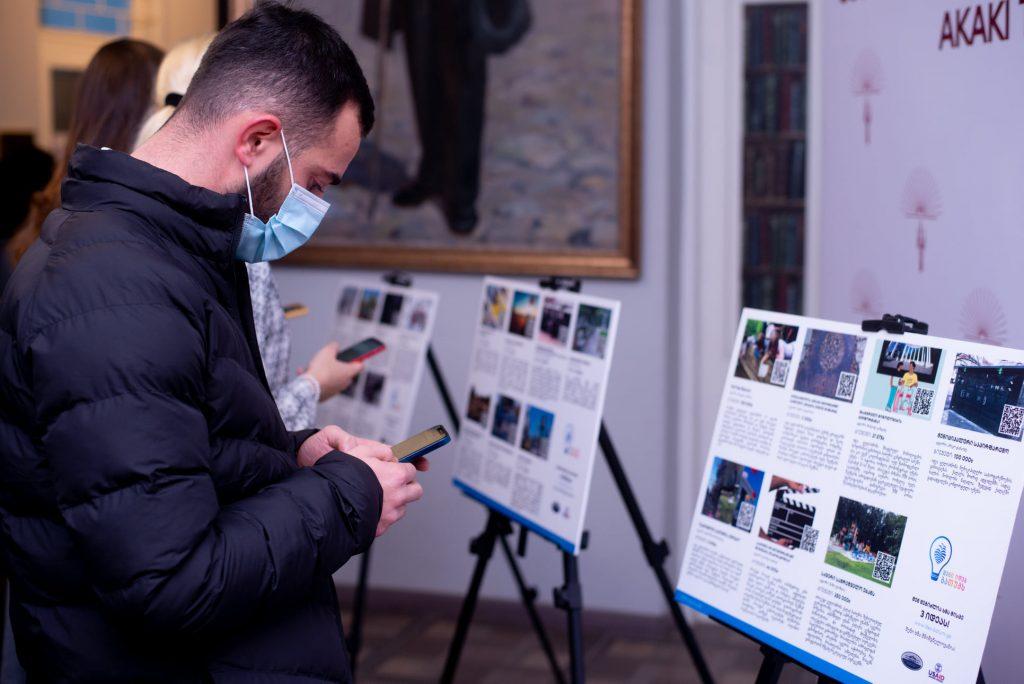
A resident engages with the Your Idea to Batumi project in Batumi, Georgia.PHOTO: Credit: შენი იდეა ბათუმს / Idea Batumi Facebook Page
That being said, the book also identifies successful open government practices in municipalities where local governments are more open to social change and new initiatives. With two flagship projects Manage from Home and Plan City Budget, Ozurgeti is a frontrunner in this regard. The Manage from Home project envisages the live streaming of sakrebulo sessions online and the remote participation of the rural population. The project was fully implemented in five villages where special community centers were set up. According to the sakrebulo chair, each sakrebulo session has about 1,000 views, which is a high number by local standards. The Plan City Budget project allows citizens living in the city of Ozurgeti to present and vote for their priority budget initiatives. The winning initiatives were funded by the local budgets of Ozurgeti municipality for 2020 and 2021. These inclusive projects have brought a tangible reward for Ozurgeti. In 2020, Ozurgeti joined OGP Local alongside Akhaltsikhe and Khoni. All three municipalities are currently busy implementing local action plans.
Other notable open government projects described in the book include Citizen Budget in Gori and Zugdidi allowing local residents to spend the portion of the local budget according to their priorities; Your Idea to Batumi through which Batumians can register their ideas/budget initiatives and vote for the desired initiative to be funded from the local budget; and Initiative.ge in Telavi within which the CSOs and the local government have a joint advisory council tasked with selecting the citizens’ initiatives for funding from the local budget. Finally, it was a rewarding personal experience to help Marneuli local government involve youth volunteers to conduct a public survey of budget priorities that were later incorporated into the 2020 municipal budget.
My key recommendation for moving forward with open governance and decentralization reforms in Georgia is to establish knowledge-based communities in different settlements – giving some of the powers and resources of the municipalities to them and creating a platform for their collaboration. Similar to the civil townships in the US, parish councils in the UK, and communes in France and Italy, such civic communities with relevant powers and resources to independently decide on issues of communal concern would increase public participation and influence in local policy-making. The devolved powers to small social groups living in a common territory would also likely increase the use of innovative approaches in that territory, which can become a source of inspiration for other similar territorial groups. For instance, successful practices in Georgian communities could inspire other communities not only within Georgia but also in fellow Eastern Partnership countries to follow suit. The Citizen Budget project is a good illustration. It started off in Marneuli and then spread to Gori and other municipalities. Regular repetition of such successful practices helps foster a culture of self-organization within the respective communities, establishes new thematic connections between them, and equips their members with sectoral expertise. Success is contagious!
Entre el 2013 y el 2019 me desempeñé como investigador nacional para el Mecanismo de Revisión Independiente en Georgia. Desde entonces, he tenido especial interés en implementar el valor de la apertura y la rendición de cuentas en los gobiernos locales. Entre 2014 y 2015, Georgia implementó una serie de reformas en gobiernos locales que permitieron a la ciudadanía elegir a sus alcaldes junto con miembros del consejo local (sakrebulo); además, implementaron un nuevo mecanismo de participación. Como primer punto de contacto entre la ciudadanía y el estado, los gobiernos locales son directamente responsables de atender las necesidades diarias de las comunidades y tienen más oportunidades de implementar programas participativos. Cuando lideré el programa de gobierno local del National Democratic Institute -NDI (Instituto Nacional Democrático), tuve la oportunidad de implementar esta idea. A través de este programa, conocí a alcaldes y alcaldesas, presidentes del sakrebulo, representantes de la sociedad civil y líderes comunitarios de diferentes municipios, quienes demostraron ser únicos y valiosos y fueron mi inspiración para escribir un libro. Para entonces, ya tenía siete años de experiencia práctica trabajando con actores locales. Tomé una radiografía de esta experiencia y la relacioné con conceptos teóricos relevantes. Así, publiqué las Peculiaridades de las prácticas de gobernanza abierta a nivel local en Georgia.
El libro muestra que los municipios de Georgia están bajo la influencia del gobierno central y que no tienen autoridad por sí mismos. Esta falta de descentralización debilita la implementación del modelo de gobernanza abierta en los municipios. Las comunidades locales no tienen interés en participar en el diseño de políticas públicas, pues resolver los muchos problemas que enfrentan no está en las manos de sus representantes electos. El bajo desarrollo económico, la pobreza, desempleo e infraestructura deficiente son un elemento común entre los municipios.

Residente participando en el proyecto Tu idea a Batumi en Batumi Georgia.
Crédito: შენი იდეა ბათუმს / Página de Facebook Idea BatumPHOTO: Credit: შენი იდეა ბათუმს / Idea Batumi Facebook Page
Dicho esto, el libro identifica prácticas de gobierno abierto que han sido implementadas exitosamente en los municipios en los que los gobiernos locales están más abiertos al cambio social y a promover iniciativas nuevas. Ozurgeti es líder en el campo y ha implementado dos proyectos bandera: Administra desde casa y Planea los presupuestos municipales. El proyecto Administra desde casa promueve la transmisión en vivo de las sesiones del sakrebulo y la participación a distancia de la población rural. El proyecto se implementó por completo en cinco localidades en las que se establecieron centros comunitarios. Según el presidente del sakrebulo, cada sesión ha registrado alrededor de 1000 vistas, cifra alta considerando los estándares locales. Por su parte, el proyecto Planea los presupuestos municipales permite a la ciudadanía de Ozurgeti presentar iniciativas sobre cómo aplicar los presupuestos y votar por otras propuestas. Las iniciativas ganadoras son financiadas a través del presupuesto municipal de Ozurgeti de 2020 y 2021. Estos proyectos incluyentes han traído beneficios tangibles a Ozurgeti. En 2020, se incorporó a OGP Local, junto con Akhaltsikhe y Knoni. Los tres municipios se encuentran implementando sus planes de acción locales.
Otros proyectos de gobierno abierto destacados que describo en el libro son 1) Presupuestos ciudadanos en Gori y Zugdidi, a través de los cuales la ciudadanía puede decidir cómo asignar una porción del presupuesto según sus prioridades; 2) Tu idea a Batumi a través del cual las y los residentes de Batumi pueden registrar sus ideas o iniciativas presupuestarias y votar por la iniciativa que será financiada con el presupuesto local; 3) Intiative.ge de Telavi, a través del cual las organizaciones de la sociedad civil y el gobierno tienen un consejo asesor conjunto que tiene el objetivo de seleccionar las iniciativas ciudadanas que serán financiadas con el presupuesto. Finalmente, fue gratificante ayudar al gobierno local de Marneuli a involucrar a jóvenes voluntarios en la aplicación de una encuesta sobre presupuestos para identificar prioridades que serían incorporadas en el presupuesto municipal de 2020.
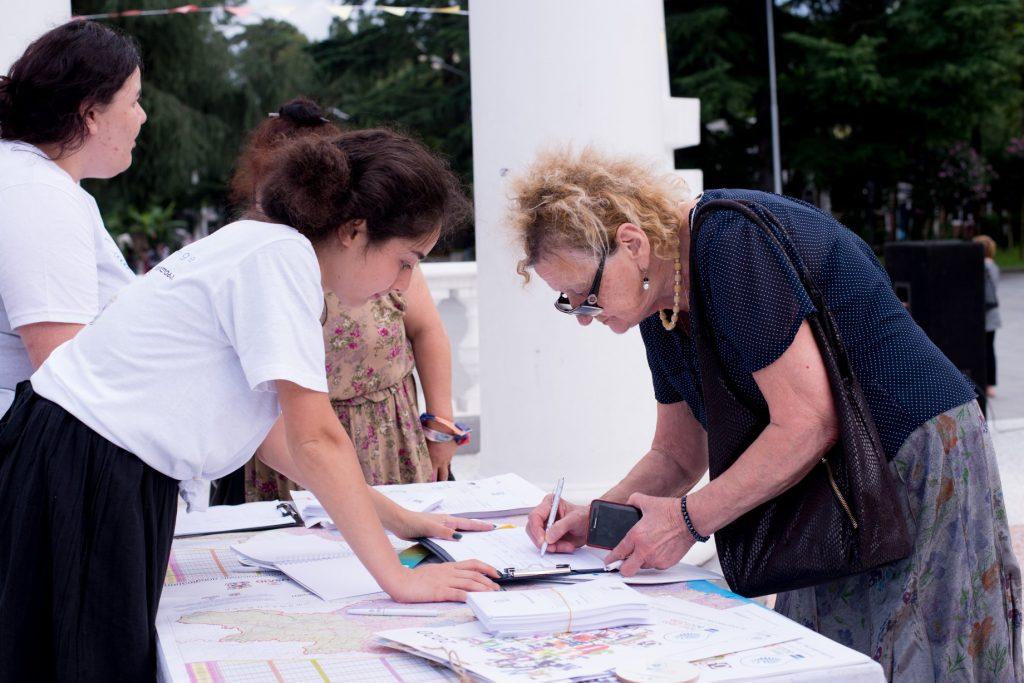
Residentes participando en el proyecto Tu idea a Batumi en Batumi Georgia.
Crédito: : შენი იდეა ბათუმს /Página de Facebook de Idea Batumi
Mi recomendación principal para la gobernanza abierta y la descentralización de las reformas en Georgia es establecer comunidades de conocimiento en diferentes localidades y otorgarles algunas de las competencias y recursos de los municipios y crear una plataforma de colaboración. Como en el caso de las audiencias municipales de Estados Unidos, los consejos parroquiales del Reino Unido y las comunas de Francia e Italia, estas comunidades cívicas con competencias relevantes y recursos para tomar decisiones sobre temas de interés común incrementarían la participación del público y mejorarían el diseño de políticas públicas. La devolución del poder a grupos sociales que viven en territorios comunes incrementaría el uso de estrategias innovadoras en los territorios, lo cual podría inspirar a otros grupos. Por ejemplo, las prácticas exitosas de las comunidades de Georgia podrían inspirar a otras comunidades, no solo de Georgia, sino también de otros países de la Alianza de Europa Oriental. El proyecto Presupuesto Ciudadano es un buen ejemplo de ello. Empezó en Marneuli y se extendió a Gori y otros municipios. La repetición de las prácticas exitosas promovería una cultura de autoorganización con sus respectivas comunidades, establecería nuevos vínculos temáticos entre ellos y los capacitaría con experiencia sectorial. ¡El éxito es contagioso
No comments yet
Related Content

Eastern Partnership Programme
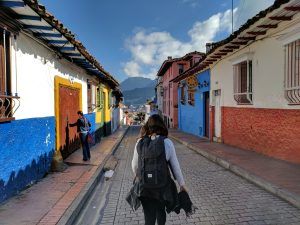
OGP Local
Through OGP Local, participants can learn how to use open government values such as transparency, accountability, responsiveness, and inclusion to better meet the needs of the citizens they serve.
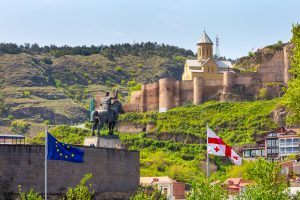
Georgia
Georgia’s fifth action plan spans government transparency, open data, and social inclusion. The co-creation process stalled several times and many proposals from civil society were excluded or reduced in scope,…

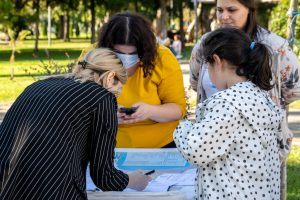
Leave a Reply